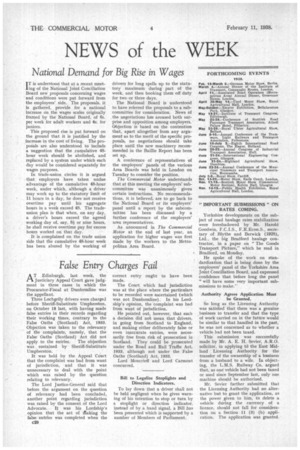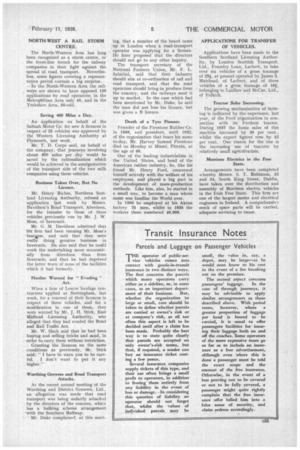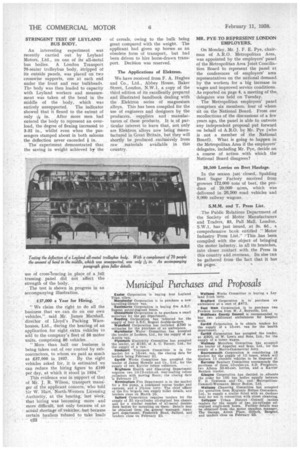False Entry Charges
Page 70

Page 71

Page 72

If you've noticed an error in this article please click here to report it so we can fix it.
Fail
AT Edinburgh, last week, the Justiciary Appeal Court gave judgment in three cases in which the Procurator-Fiscal at Dunfermline was the appellant.
Three Loch golly drivers were charged before Sheriff-Substitute Umpherston, on October 13 last, with having made false entries in their records regarding their working times, contrary to the False Oaths (Scotland) Act, 1933. Objection was taken to the relevancy of the complaints, namely, that the False Oaths (Scotland) Act did not apply to the entries. The objection was sustained by Sheriff-Substitute Umpherston.
It was held by the Appeal Court that the complaint was bad from want of jurisdiction, and that it was unnecessary to deal with the point which was raised by the question relating to relevancy.
The Lord Justice-General said that before the argument on the question of relevancy had been concluded, another point regarding jurisdiction was raised by the consent of the Lord Advocate. It was his Lordship's opinion that the act of 'illiaking the false entries was completed when the
c20 correct entry ought to have been made.
The Court which had jurisdiction was at the place where the particulars to be recorded were ascertained (which was not Dunfermline). In his Lordship's opinion, the complaint was bad from want of jurisdiction,
He pointed out, however, that such a decision did not mean that drivers, in going from Scotland to England, and making either deliberately false or even inaccurate entries, were necessarily free from risk of prosecution in Scotland. They could be prosecuted under the Road and Rail Traffic Act, 1933, although not under the False Oaths (Scotland) Act, 1933.
Lord Moncrieff and Lord Carmont concurred.
Bill to Legalize Stoplights and Direction Indicators.
To lay down that a driver shall not be held negligent when he gives warning of his intention to stop or turn by a stoplight or direction indicator, instead of by a band signal, a Bill has been presented which is supported by a number of Members of Parliament.
"IMPORTANT SUBMISSIONS" ON RATES COMING.
Yorkshire developments on the subject of road haulage rates stabilization were foreshadowed by Mr. Harold Goodwin, F,C.I.S., F.R.Econ.S., secretary of Blythe and Berwick (1928), Ltd., the big Bradford haulage contractor, in a paper on "The Goods Transport Picture," which he read in Bradford, on Monday.
He spoke of the work on standardization that is being done by the employers' panel of the Yorkshire Area Joint Conciliation Board, and expressed confidence that before Tong the panel "will have some very important submissions to make."
Authority Agrees Application Must
So long asbLGrLicensing Authority was satisfied that there was a genuine business to transfer and that the type of work carried on in the future would be similar to that handled in the past, he was not concerned as to whether a vehicle had not been taxed.
This submission was successfully made by Mr. A. E. H. Sevier, A.R.O. solicitor, in applying tO the East Midland Licensing Authority for the transfer of the ownership of a business from a husband to a wife. In objecting, the L.M.S. Railway Co. argued that, as one vehicle had not been taxed or used since September last, only one machine should be authorized.
Mr. Sevier further submitted that the Licensing Authority had no alternative but to grant the application, as the power given to him, to delete a vehicle during the currency of a licence, should not fall for consideration on a Section 11 (3) (b) application. The application was granted. NORTH-WEST A RAIL STORM CENTRE.
The North-Western Area has long been recognized as a storm centre, or the front-line trench for the railway companies in their fight against the spread of road transport. Nevertheless, some figures covering a representative period contain a big surprise. in the North-Western Area the railways are shown to have opposed 150 applications by road operators; in the Metropolitan Area only 40, and in the Yorkshire Area, 50-odd.
Saving 400 Miles a Day. • An application on behalf of the Saltash Motor Co. for new A licences in respect of 25 vehicles was approved by the Western Licensing Authority at I'lymouth, last week.
Mr. T. D. Corpe said, on behalf of the company, that journeys involving about 400 miles per day would be saved by the rationalization which would be achieved in the amalgamation of the transport side of the two milk companies using these vehicles.
Business Taken Over, But No Licence.
Mr. Henry Riches, Northern Scotland Licensing Authority, refused an application last week by Messrs. Davidson's Road Transport, Aberdeen, for the transfer to them of three vehicles previously run by Mr. J. W. Moss, of Inverurie.
Mr. G. M. Davidson admitted that his firm had been running Mr. Moss's business, and said that they were really doing genuine business in Inverurie. He also said that he could work the undertaking more economic ally from Aberdeen than from Inverurie, and that he had deprived the latter town of none of the facilities which it had formerly.
Haulier Warned for " Evading " Act.
When a firm of Loscoe haulage contractors applied at Nottingham, last week, for a renewal of their licences in respect of three vehicles, and for a modification in one of them, they were warned by Mr. J. H. Stirk, East Midland Licensing Authority, who alleged that they had evaded the Road and Rail Traffic Act.
Mr. W. Slack said that he had been buying and selling bricks and sand, in order to carry them without restriction.
Granting the licences on the same conditions as previously, Mr. Stirk said: " I have to warn you to be careful. I don't want to put it any higher."
Worthing Growers and Road Transport Attacks.
At the recent annual meeting of the Worthing and District Growers, Ltd.. an allegation was made that road traesport was being unfairly attacked by the directors of the concern, svhica has a balking scheme arrangement 'With the Southern Railway.
Mr. Duke complained, at this meet
ing, that a member of the board came up to London when a road-transport operator was applying for a licence. He later proposed that the directors should not go to any other inquiry.
The transport secretary of the National Farmers Union, Mr. F. L. Sabatini, said that their industry should aim at co-ordination of rail and road transport, and -that the road operators should bring in produce from the country, and the railways send it up to market. In the case which had been mentioned by Mr.. Duke, he said the man did not lose his licence, but was given a B licence.
Death of a Tyre Pioneer.
Founder of the Firestone Rubber'Co. in 1896, and president, until 1932, of the organization that bears his name to-day, Mr. Harvey Samuel Firestone died on Monday at Miami. FlOrida, at the age of 69.
One of the leading industrialists in the United States, and head of the American rubber industry, he, like his friend Mr. Henry Ford, concerned himself actively with the welfare of his employees, and played a big part in the development of mass-production methods. Like him, also, he started in a small way, to become a man whose name was familiar the World over.
In 1900 he employed at his Akron factory 75 men, whilst in 1935 the workers there numbered 40,000. APPLICATIONS FOR TRANSFER OF VEHICLES.
Applications have been made to the Southern Scotland Licensing Authority, by London Scottish Transport, Ltd., Foundry Loan, Larbert, to take over six vehicles of a gross tonnage of 29i, at present operated by James S. Muirhead, of Larbert, and of three vehicles of a gross tonnage of 18i, belonging to Laidlaw and McCue, Ltd., of Falkirk.
Tractor Sales Increasing.
The growing mechanization of farmiug is indicated by the'experience, last year, of the Ford organization in connection with its Fordson tractor. During 1937 the home sales of this machine increased by 30 per cent., whilst the export figure rose by 52 per cent. One reason for the rise is the increasing use of tractors by relatively small agricelturists.
Morrison Electrics in the Free State.
Arrangements have been completed whereby Messrs. S. T. Robinson, 33 and 34, South King Street, Dublin, have taken over the distribution and assembly of Morrison electric vehicles in the Irish Free State. This firm are one of the largest motor and electrical engineers in Ireland. A comprehensivs stock of spare parts will be carried, adequate servicing to ensue. STRINGENT TEST OF LEYLAND BUS BODY.
An interesting experiment was recently carried out by Leyland Motors, Ltd., on one of its all-metal bus bodies. A London Transport 70-seater trolleybus body, Stripped Of its outside panels, was placed' on two crosswise supports, one at each end under the front and rear bulkheads. Thbody was then loaded to capacity with Leyland workers and measurement was taken of the bend in the middle of the body, which was entirely unsupported. The indicator showed that it flexed to the extent of only -rig in. After more men had entered the body to represent an overload, the degree of flexing increased to 3-32 in., whilst even when the passengers stamped about in both saloons the deflection never exceeded The experiment demonstrated that the saving in weight achieved by the
use of cross:bracing in place of a full trussing panel did not affect the strength of the body.
The test is shown in progress in an accompanying illustration.
£37,000 a Year for Hiring.
" We claim the right to do all the business that we can do on our own vehicles," said Mr. James Marshall, director of Lloyd's Packing Warehouses, Ltd., during the hearing of an application for eight extra vehicles to add to the company's fleet of 56 motor units, comprising 86 vehicles.
" More than half our business is being taken out of our control by subcontractors, to whom we paid as much
as 237,000 in 1937. By the eight• vehicles asked for, it is estimated we can reduce the hiring figure to £100
• per day, at which it stood in 1934."
• This evidence was in support of that of Mr. J. R. Wilson, transport mane:ger of the applicant concern, who told Sir W. Hart, North-Western Licensin., Authority, at the hearing, last week': that hiring was becoming more and more difficult, not only because of an
• actual shortage of .vehicles, but because certain hauliers refused to take loads c22 of cereals, owing to the bulk being great compared with the weight. The applicant had given up horses as an obsolete form of transport, but had been driven to hire horse-drawn transport. Decision was reserved.
• The Applications of Elektron.
We have received from F. A. Hughes and Co., Ltd., Abbey House, Baker Street, London, N.W.1, a copy of the third edition of its excellently prepared and illustrated handbook dealing with the Elektron series of magnesium alloys. This has been compiled for the use of engineers and designers by the producers, suppliers and manufacturers of these products. It is. of particular interest to learn that, not only are Elektron alloys now being manufactured in Great Britain, but they will shortly be produced exclusively from raw .materials available in this country.
MR. PYE .TO REPRESENT LONDON EMPLOYERS.
On Monday, Mr. J. F. E. Pye, chairman of A.R.O. Metropolitan Area. was appointed by the employers' panel of the Metropolitan Area Joint Conciliation Board to represent the panel at the conferences of employers' area representatives on the national demand by the workers for a big increase in wages and improved service conditions. As reported on page 4, a meeting of the\ delegates was held on Tuesday.
The Metropolitan employers' panel comprises six members, four of whem sit on the National Board. From our recollections of the discussions of a few years ago, the panel is able to outvote any independent proposal put forward on behalf of A.R.O. by Mr. Pye (who is not a member of the National Board). What is going to happen in the Metropolitan Area if the employers' delegates, including Mr. Pye, decide on a course of action with which the National Board disagrees?
26,500 Lorries on Beet Haulage.
In the season just closed,. Spalding Beet Sugar Factory received from growers 172,000 tons of beet, the produce of 20,000 acres, which was delivered in 26,500 road vehicles and 8,000 railway wagons.
S.M.M. and T. Press List.
The Public Relations Department of the Society of Motor Manufacturers and Traders, 83, Pall Mall, London, S.W.1, has just issued, at 38. 6d., a comprehensive bcok entitled " Motor Industry Press List." 'This has been compiled with the object of bringing the motor industry, in all its branches, into closer contact with the Press in this country and overseas. Its size can be gathered from the fact that it has 64 pages.




























































































































































